- News
- Reviews
- Bikes
- Accessories
- Accessories - misc
- Computer mounts
- Bags
- Bar ends
- Bike bags & cases
- Bottle cages
- Bottles
- Cameras
- Car racks
- Child seats
- Computers
- Glasses
- GPS units
- Helmets
- Lights - front
- Lights - rear
- Lights - sets
- Locks
- Mirrors
- Mudguards
- Racks
- Pumps & CO2 inflators
- Puncture kits
- Reflectives
- Smart watches
- Stands and racks
- Trailers
- Clothing
- Components
- Bar tape & grips
- Bottom brackets
- Brake & gear cables
- Brake & STI levers
- Brake pads & spares
- Brakes
- Cassettes & freewheels
- Chains
- Chainsets & chainrings
- Derailleurs - front
- Derailleurs - rear
- Forks
- Gear levers & shifters
- Groupsets
- Handlebars & extensions
- Headsets
- Hubs
- Inner tubes
- Pedals
- Quick releases & skewers
- Saddles
- Seatposts
- Stems
- Wheels
- Tyres
- Health, fitness and nutrition
- Tools and workshop
- Miscellaneous
- Tubeless valves
- Buyers Guides
- Features
- Forum
- Recommends
- Podcast
feature
8 reasons not to get disc brakes — find out the hassles before you switch
Disc brakes have become an increasingly important part of the road bike world over the past few years, but while the benefits of disc brakes are well documented, they bring with them challenges and problems too.
Here are some of the issues that we've experienced and heard about.
1 Disc brakes add weight
The all-up weight of a disc brake bike is higher than that of a rim brake bike.
Levers, brake callipers, hoses, fluid and rotors weigh more than an equivalent rim brake setup. Manufacturers often try to minimise the difference but don't forget that disc brake hubs are heavier too, and disc brake wheels are often built up with more spokes of a wider gauge, although the lack of a brake track means that disc-specific rims are generally lighter. The thru axles that are used with many disc systems are heavier than quick release skewers.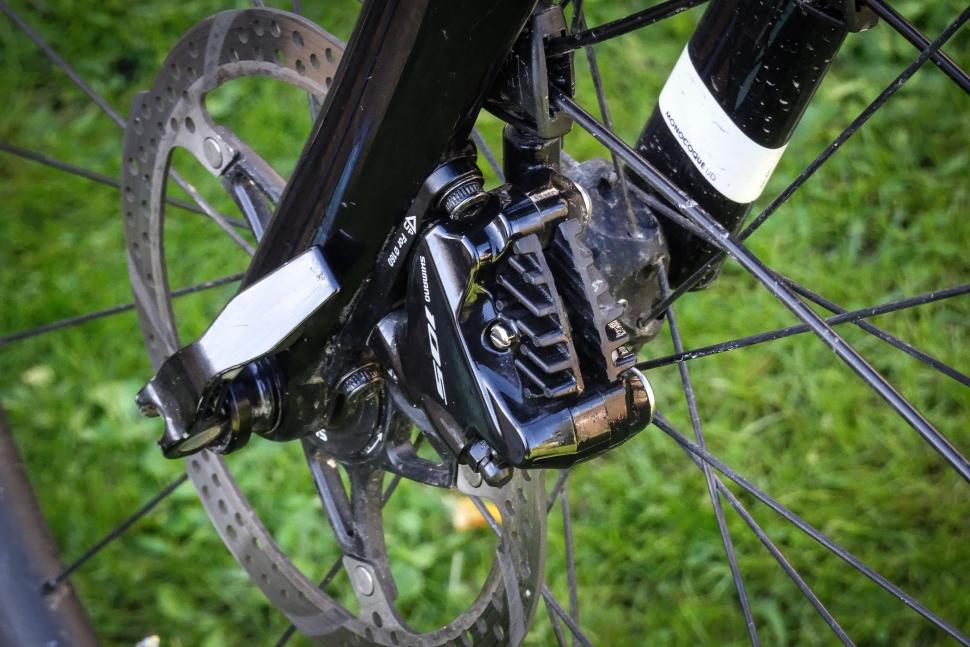
Read Everything You Need To Know About Disc Brakes
The weight difference isn't huge but it can often be around a pound over the whole bike when everything is taken into account.
2 Disc brake rub can be an issue
Early disc-equipped bikes borrowed the 74mm post mount standard from mountain bikes, where the brake calliper is simply bolted directly onto the frame or fork and adapters are used to accommodate different rotor sizes.
To try and improve the appearance of discs on road bikes, Shimano introduced its flat mount system. It’s an open standard that has been quickly adopted by other disc brake manufacturers. The vast majority of new disc brake road bikes are flat mount.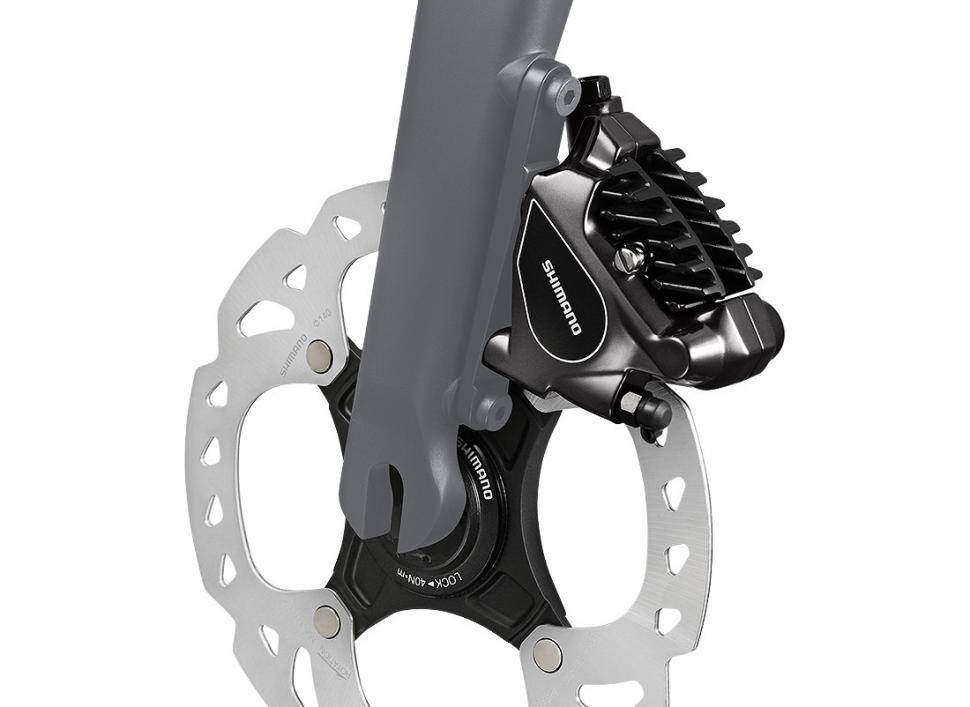
“[Flat mount offers a] smaller and more compact interface with the frame/fork for improved integration, reduced weight and better tool access for easier adjustment,” Shimano told road.cc.
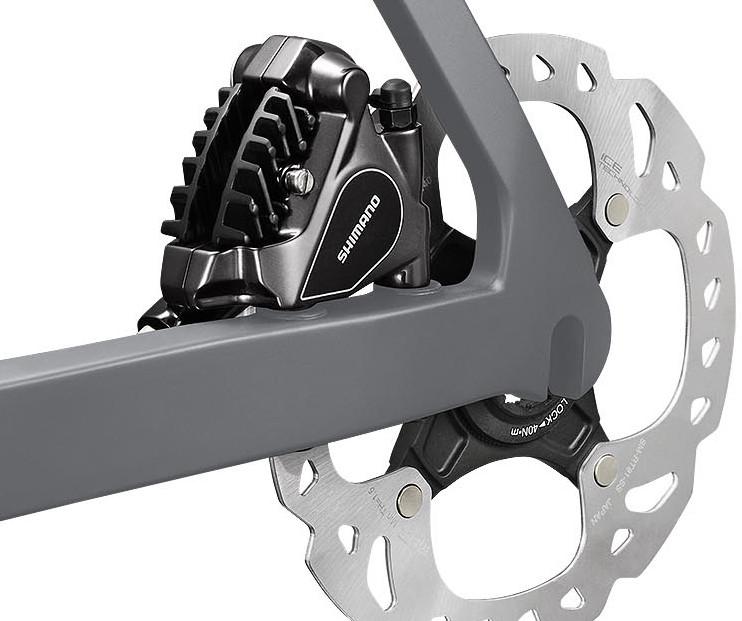
There’s no doubt flat mount disc callipers are smaller, better looking and lighter than the bulkier post mount callipers. The actual calliper mechanism is identical and there are no changes to the way the hose connects and the brake pads are installed. The key difference is in the way the calliper is mounted to the frame.
Where post mount callipers are bolted from above directly into the frame and fork, flat mount callipers sit flush with the frame and fork and the bolts are threaded in from below and directly into the calliper, pulling it down onto the frame. At the front, the calliper is fixed to a thin adapter which is bolted to the fork.
Depending on frame design and disc rotor size, post mount often needs a large and ugly adapter to provide the correct spacing over the rotor. On mountain bikes with many different frame designs and more rotor sizes in use, that versatility is a good thing, but the road market leans towards just 140mm and 160mm rotor sizes, for which flat mount has been designed.
We’ve had mostly good experiences with flat mount on the disc-equipped bikes we’ve tested, but there have been a couple of incidents of brake rub, and there's nothing more annoying.
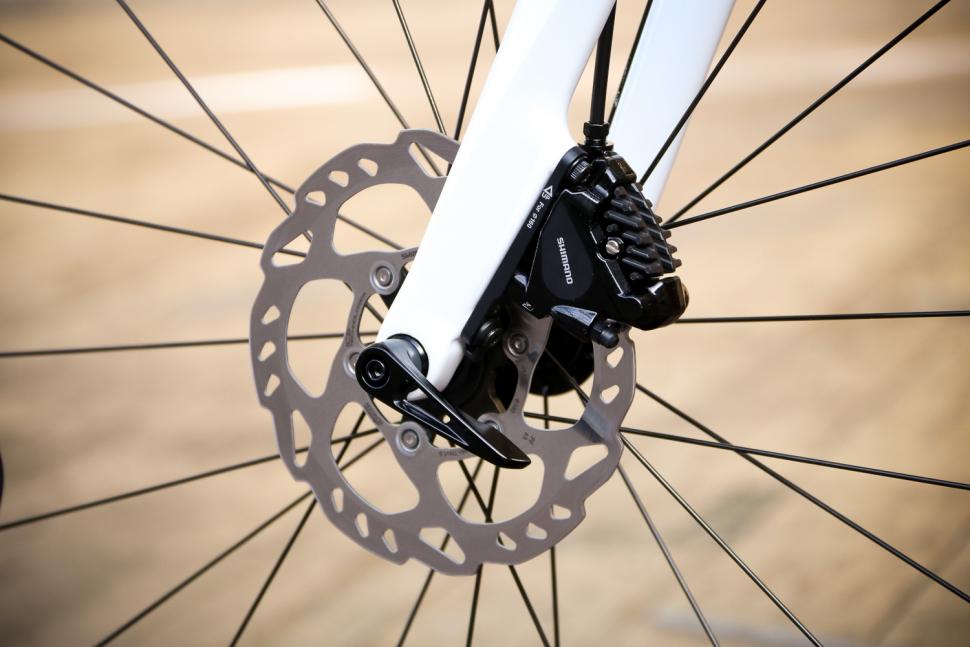
We asked Shimano about this problem and it told us that cleanly faced mounts are very important.
“As with post mount, a plane contact area (facing) always helps, as does the size of the disc (smaller is better). Centerlock rotors on good stable axle bearings (compared to 6-bolt rotors on lightweight hub axles) also help with alignment. The construction of the fork is also important (stiffness balance left/right),” said Shimano.
You'd hope a frame or fork manufacturer would make sure that the contact area was right, but in our experience this isn’t always the case.
Facing tools ensure the brake mounts on the frame and fork are smooth and level and provide perfect alignment. They're expensive and not really suitable for most home mechanics, although all good bike shops should be able to help you out here. Park Took does an adapter for its DT-5.2 Disc Brake Mount Facing Set and you can see it in action in this video.
The other solution to disc brake rub is to adjust the calliper on the frame/fork. With post mount it’s relatively easy: just slacken off the bolts, pull the brake lever and tighten the bolts to centre the calliper over the rotor.
“The range of adjustment for flat mount is the same as for post mount," says Shimano. "The difference is that the side-to-side adjustment is no longer on the calliper but in the slot hole instead. Shimano recommends that this hole is 4 x 5.2mm (+/- 0.1mm) but sometimes manufacturers don’t follow these recommendations. For the front calliper the adjustment is in the adaptor plate with the same hole dimensions.”
Not all manufacturers are adhering to the requirements as closely as they should. In many cases, the flat mount range of adjustment appears to be less than in post mount systems. We like flat mount but it does mean you are at the mercy of bike companies ensuring the mounts are manufactured correctly.
3 Disc brakes affect aerodynamics
Like any other external component, disc brakes affect aerodynamics. Some manufacturers have stated that the rim brake version of a particular bike is more aerodynamically efficient than the disc brake model, but it's not as simple as saying that rim brakes are always more aero.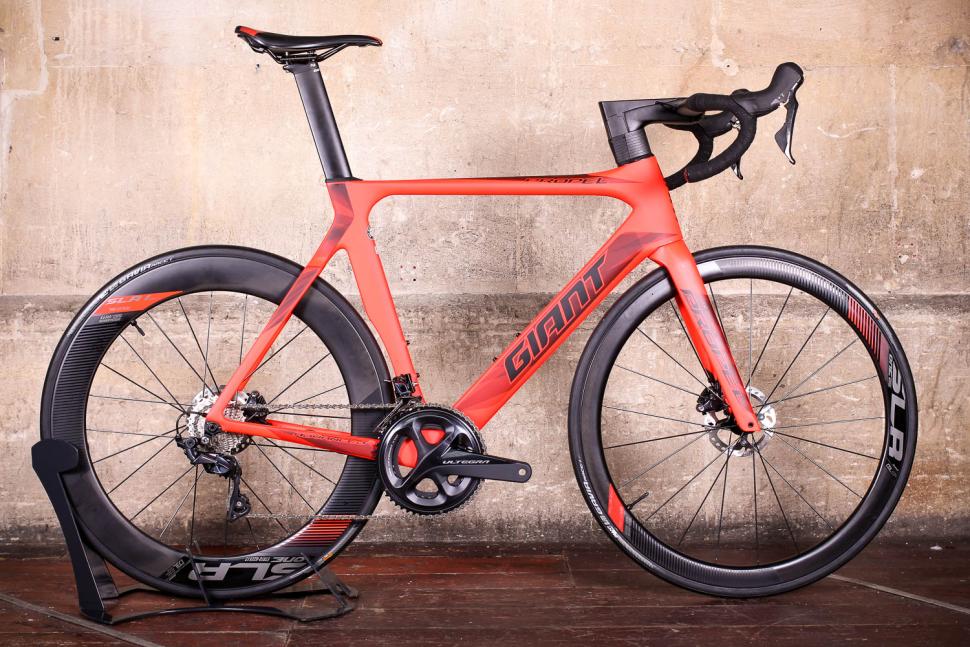
When Giant revealed its Propel Disc in 2017, for example, it said, "Engineers found that, with proper integration, a disc-brake design can actually improve aero performance compared to rim-brake configurations.
“This is because the location of traditional callipers (either in front or behind the fork crown/ legs) creates 'dirty' air'. Opening up the fork crown area (by placing the disc-brake callipers down at the hub) means that the air hitting the new disc-brake calliper has already been disrupted by the leading edge of the tyre/wheel. This effect is further enhanced by an asymmetric fork that helps smooth out airflow over the calliper.”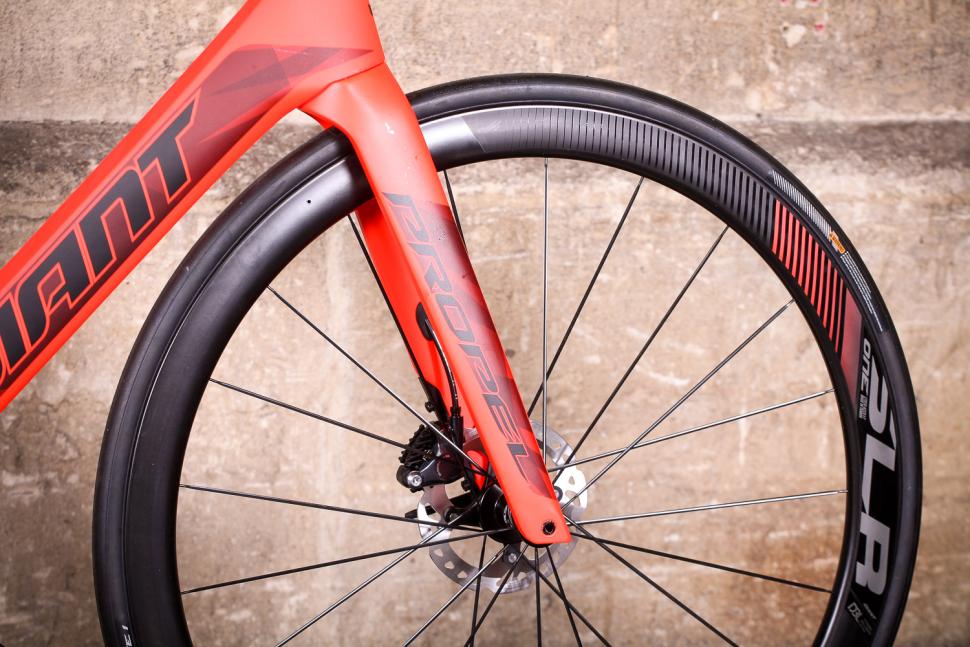
A handful of new aero road bikes, like the Cannondale SystemSix and 2019 Specialized Venge, are disc brake-only.
4 Choosing pads is a minefield
Switch to a disc brake bike and you'll eventually have to choose new pads... and that's a minefield.
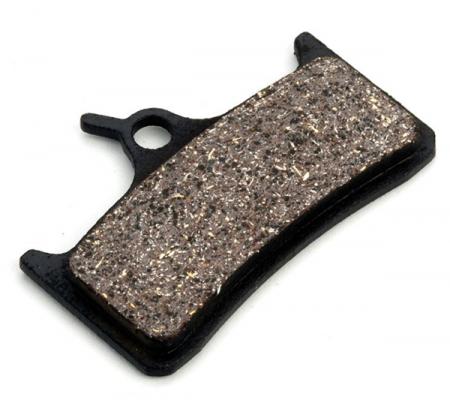
All pads are made by mixing various powdered additives with a binding agent and then squashing it all together at high heat and pressure to form a solid block on the backing pad. What's in the mix of powders has a major effect on the pad's properties.
Most new bikes come fitted with resin pads. They're made from non-metallic additives such as rubber, glass, carbon and Kevlar to provide an all-around pad that works for most people but isn't very durable under hard use.
Find out more about disc brake pads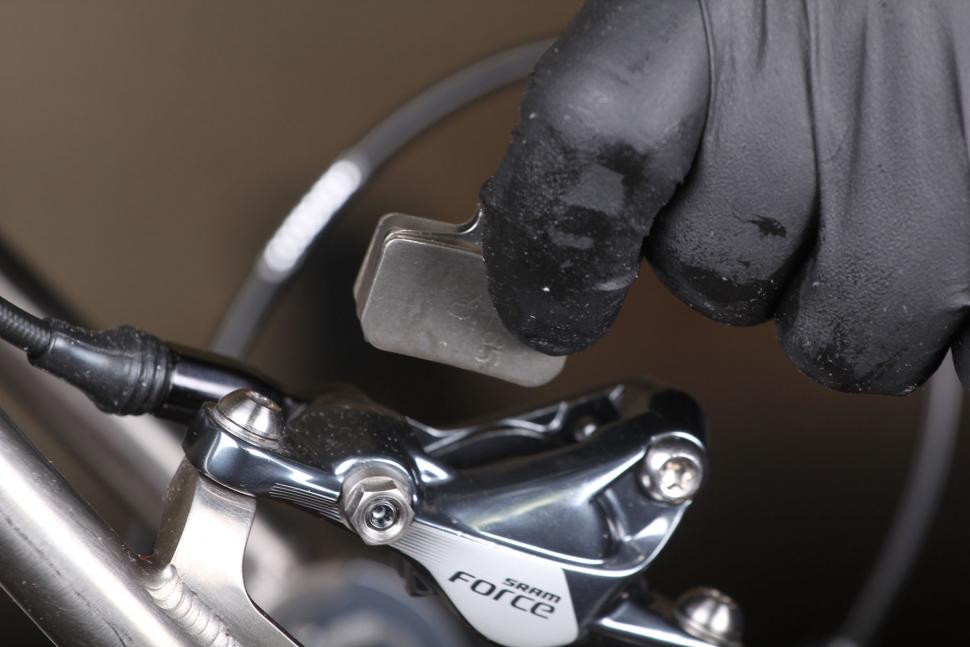
If you live anywhere hilly and/or ride in all weathers then you're probably better off switching to more expensive but much longer lasting sintered pads. Also known as metallic brake pads, these use a very high proportion of metallic fillers such as copper, steel and iron. They provide strong, effective braking at high pad temperatures although their bite can be poor when they're cold and they'll wear out your rotors quicker than resin pads.
5 You need to bed in new brakes
New disc brake pads and rotors don't immediately perform to their full potential – they need bedding in first. This is a process that distributes pad material over the rotor to increase the friction, and maximises the contact area between the two surfaces.
Here's how to look after disc brakes to get the best performance out of them
Thankfully, bedding in is pretty straightforward. Here's SRAM's advice:
"Accelerate the bike to a moderate speed and then firmly apply the brakes until you are at walking speed. Repeat this process 20 times. Then accelerate the bike to a faster speed and apply the brakes until you are at walking speed. Repeat this process 10 times. It’s important that during this process you never come to a complete stop or lock up the wheels at any point."
This will improve the performance of your brakes massively and prepare them for normal riding.
6 Maintenance involves a new set of skills
Chances are that you know how to adjust rim brakes and swap the pads, and probably how to change the cables too. You might have been doing it since you were a kid. Depending on your cycling background, disc brake maintenance might be entirely new to you.
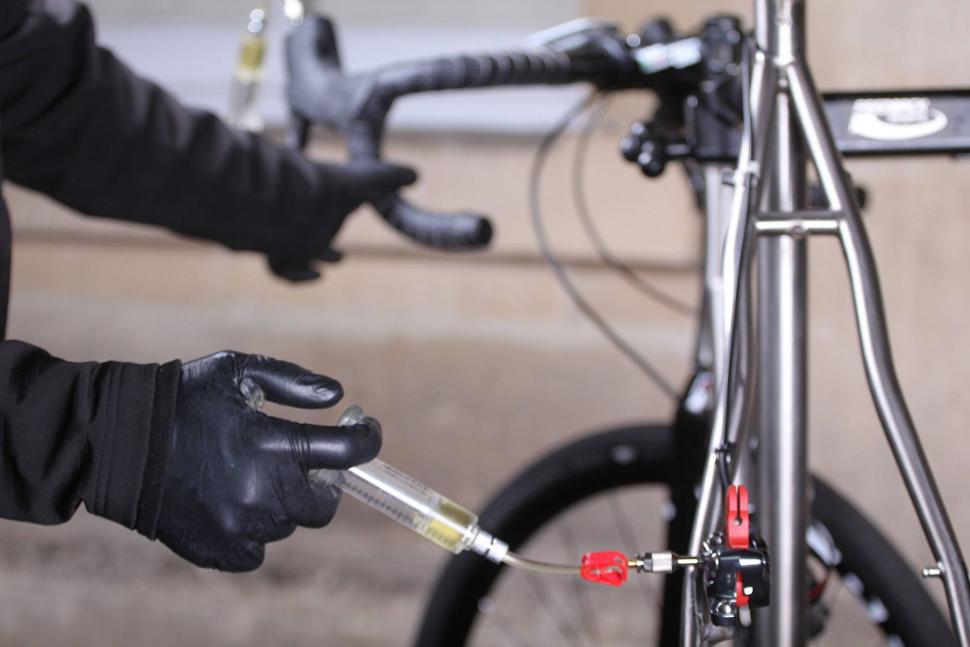 One issue you could encounter with hydraulic disc brakes is a soft and mushy feel because of air in the system. This requires bleeding and means either a trip to a bike shop or shelling out on a bleed kit. Each manufacturer has its own bleed kit. Shimano and SRAM, for example, use different techniques and fluid.
One issue you could encounter with hydraulic disc brakes is a soft and mushy feel because of air in the system. This requires bleeding and means either a trip to a bike shop or shelling out on a bleed kit. Each manufacturer has its own bleed kit. Shimano and SRAM, for example, use different techniques and fluid.
Bleeding a hydraulic disc brake system isn't the most onerous of tasks but you will need to get the hang of it while following a guide or watching one of our videos.
7 They can squeal!
It's true that rim brakes can squeal but we reckon that disc brakes are worse offenders.
The most common cause of disc brakes squealing is contamination of the rotor or pads. You have to be careful when using spray lubricants on a bicycle with disc brakes, or avoid them altogether.
Find out how to stop your brakes squealing
“Cleaning your rotors regularly with a specific (oil-free) disc brake degreaser is a good way to avoid squealing brakes," says Shimano. "Cleaning your pads too can help quieten things down — you can try some sandpaper or grinding the pads — but if the grease has soaked through the pad, you might need to replace them. Don't use a degreaser or chemicals on brake pads, though.”
It’s harder to clean disc brake pads than rim brake pads, largely because you have to remove them from the bike in the first place.
What's the best way to clean disc brakes?
Squealing pads can also be a sign that the pads are worn out. It's a little more tricky to take a close look at disc brake pads than it is with rim brake pads, although taking the wheel out can make the task easier.
8 Rotors wear out... eventually
One of the advantages of disc brakes is that they don't wear out the rims of your posh carbon wheels, but don't forget that you will wear out the disc rotors. Thankfully, rotors aren't particularly expensive.
Different brands give different minimum thicknesses for their rotors (the figure is often printed on the rotors). Go beyond that limit and things become dangerous, so keep an eye on 'em.
Mat has been in cycling media since 1996, on titles including BikeRadar, Total Bike, Total Mountain Bike, What Mountain Bike and Mountain Biking UK, and he has been editor of 220 Triathlon and Cycling Plus. Mat has been road.cc technical editor for over a decade, testing bikes, fettling the latest kit, and trying out the most up-to-the-minute clothing. He has won his category in Ironman UK 70.3 and finished on the podium in both marathons he has run. Mat is a Cambridge graduate who did a post-grad in magazine journalism, and he is a winner of the Cycling Media Award for Specialist Online Writer. Now over 50, he's riding road and gravel bikes most days for fun and fitness rather than training for competitions.
Latest Comments
- Sredlums 1 hour 19 min ago
I'd counter that those brakes were in fact so inadequate that they eventually developed a whole new type of bicycle that was actually suited for it...
- levestane 1 hour 21 min ago
Unfortunately, Africa is heavily exploited both for resource extraction...
- CitizenSmith 1 hour 47 min ago
There seems to be no support for TOO) now - their email and website are defunct. They are inactive on Facebook. Aftter less than a year the rails...
- Pub bike 1 hour 53 min ago
"Bike theft hotspot"? This is just like having a sign that says "Police don't bother enforcing the law in this area. Thieves you have free reign!"
- Laz 2 hours 44 min ago
I used to daily 1hr sufferfests on indoor rollers, I drank a fair bit of water before during, and after- I noticed my sweat wasnt stinging in my...
- matthewn5 3 hours 17 min ago
I did the four windows on my Victorian flat. I replaced the parting beads (between the panes) and the staff moulds with new timber ones that have a...
- Rendel Harris 5 hours 46 min ago
Well, I don't have any insight into how all consuming being a professional cyclist is and so how much you have to put your faith in your advisors,...
- Hirsute 6 hours 27 min ago
In the comments "Was it due to icy conditions? "
- slc 9 hours 8 min ago
Marsh lane was unchanged on Friday - I don't think the contractors have been back since the protest.
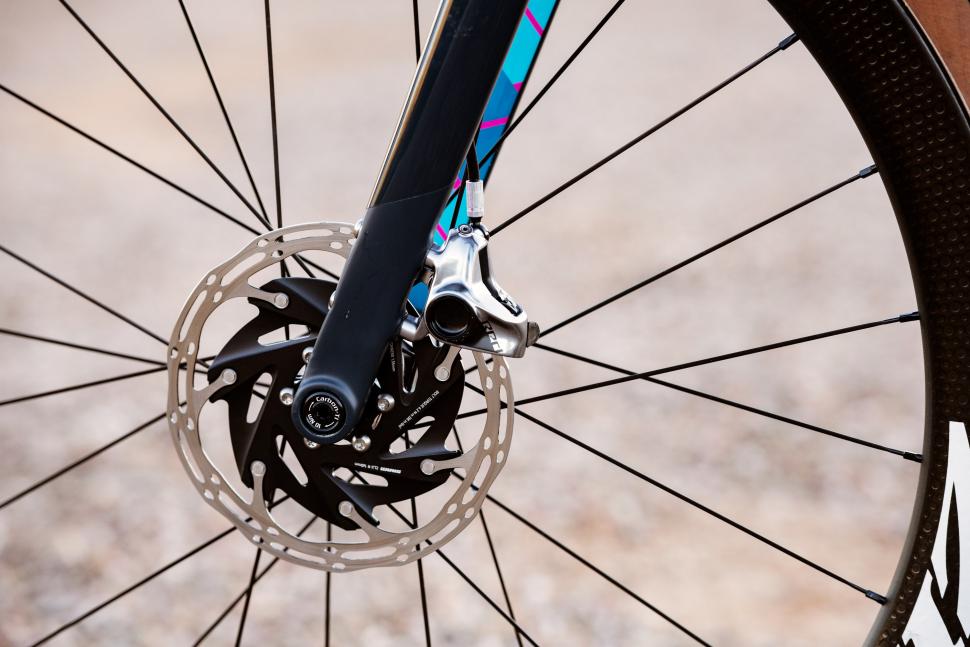
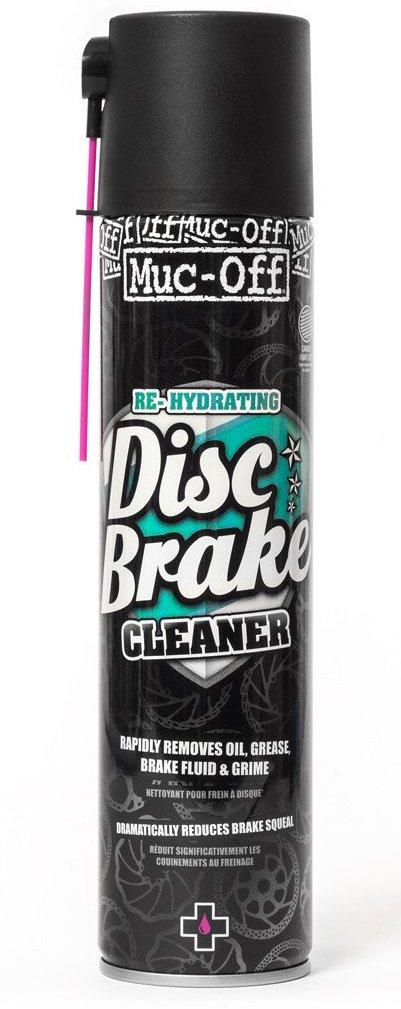
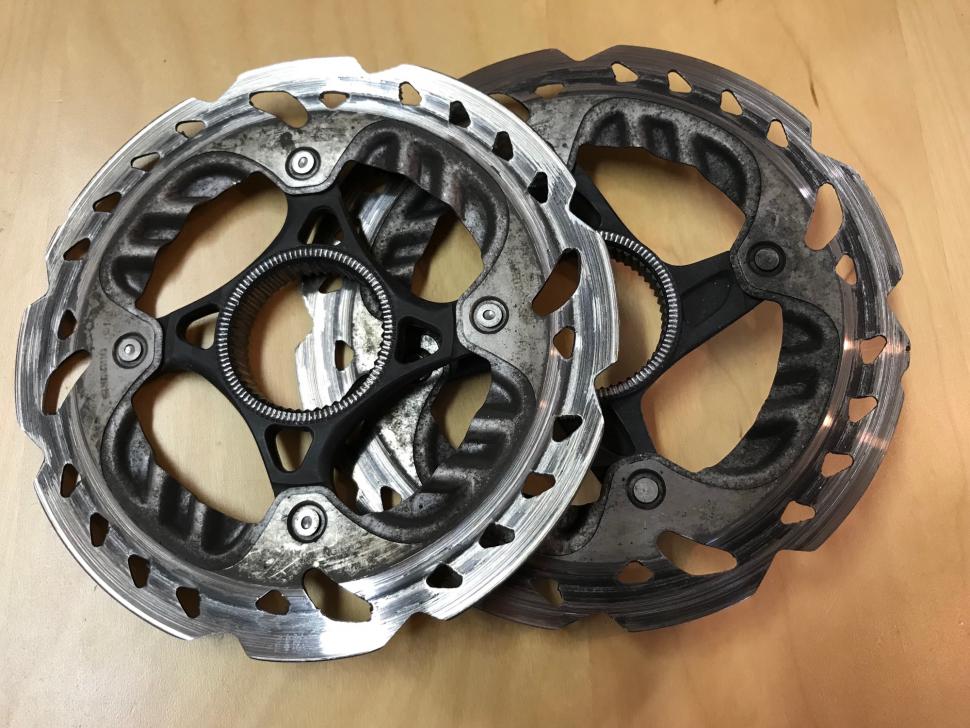
Add new comment
206 comments
You should measure them up with a caliper to see if enough material remains (how much is noted on the box that the discs come in, usually it's 1.5-2 mm but do check). Vastly depends on where you're riding but it would really surprise me if you'd worn them out in 15k km. They're steel and are a lot more durable than a rim.
I had a laugh reading some of the 'arguments' against discs. I'm never going back to rim brakes. Used to wear out one set of rims/year-18 months, riding in all weather. Disc brake maintenance is simple, just need to change the pads and -very occasionally- re-align. Pad life? Slapped in some metallic pads for winter, they'll easily last until march. I used to eat rim brake pads in autumn/winter.
Worst thing that usually happens is a rotor that gets warped due to a fall or bump and that needs straightening out or changeing. Bleeding? Once every 18 months, if you've done it once it becomes childs' play provided that you take it slow and steady.
Which is not a lot of maintenance. Which you obviously have trouble interpreting. I never said they are maintenance free...
PP
Honestly, I’m happy for you, glad you enjoy riding your bike wearing your bum bag. Just because you think other people make life hard for themselves doesn’t make it true. What makes you think that someone riding an aero bike with electronic gears and hydraulic disc brakes is making life hard for themselves? I just get my kit on and go and ride it. I can dress myself in a pair of bib shorts and a cycling jersey with a pair of socks as quickly as you can, and I don’t have to clip my bum bag on, so make life easier for myself there.
My bike(s) are ready to rock and roll as I do basic maintenance and clean them (which I would do whether it had electronic gears, cable gears, discs or rim brakes, single or double chainrings etc). It’s not hard and believe it or not some of us like bike fettling.
I plug a charger into my bike and a usb once every 1500miles or so and leave it for a few hours whilst I do something else. That’s not hard. It’s easier than charging my phone which I have to do every day.
So I haven’t heard a coherent argument against any technology from you yet. Sure, if I was touring around the world I might consider my options and probably not go for electronic gears, or rechargeable lights. But I’m not, so what I and many others have is perfectly adequate, suits our needs and doesn’t make our lives ‘hard’ as you seem to think.
Opinions are like arse-holes, everyone has one.
Sp once again, I’m genuinely happy for you riding your simplistic bike with your bum bag on, just be reciprocal in your happiness for fellow cyclists riding what, and how they want.
PP
Pretty much spot -on. I currently ride fairly vintage ( c.25 year old) steel framed bikes with, of course, rim brakes. I ride all year round, and the roads in my part of the world are pretty dire (water, mud, cow s**t, you name it). I ride, quite unconsciously, within the limits of my equipment. I am thinking of getting a new bike this year for my 68th birthday, and it will almost certainly have disc brakes, even though I actually prefer the "look" of rim brakes: function before fancy! Each to their own. Whether you are riding a shopping bike or a state-of-the art carbon flyer, if cycling puts a smile on your face you are on the right machine!.
Shame you loose thise aero gains when you factor in the loss due to the discs you need to add to brake.
and wider isn't more aero
You said "not really" but basically went on to demonstrate that it is actually more complicated to get the system work correctly.
You should also note that installing a disc brake on a fork requires that the fork be much stiffer. Particurlly for road use, this makes for a harsher and thus slower ride.
Can we stop these stupid, bullshit "facts pulled out of my arse" now please ? Use discs, use rims, use both or neither - just cut the crap FFS.
Where's the fun in that?! These threads are akin to "my bike's making a noise; what is it?".
I rarely have any disc squeal on either my road bike or mountain bike. On occasions where it occurs, it usually just needs the calipers re-aligned. An adjustment I make once every other year probably.
I'm running the same rotors on my roadbike for past 2 years with plenty of life left, they look new. Mountain bike hasn't needed new rotors ever, though I did upgrade them maybe 3 years ago and moved those between frames since.
Rotor rubbing can be an occasional problem, requiring the rotors to be trued with a couple of spanners once a year.
People discussing power are missing the point. I get that there's only so much power you can apply before the wheels lock up, disc or rim brake. The significant advantage of disc is the effort required to deliver that power - light 1 finger braking means you can focus on line, speed, and modulation, without the braking effort being a distraction - when I rode rim brakes or mechanical disc brakes I found the actual stopping vs discs a lot more stressful requiring much more focus on the braking action than on looking at the corner or obstacle I was slowing for. WIth 1 finger braking, the brakes disappear. Even more important on MTB, but still relevant on a steep descent towards a blind hairpin.
What a discussion about silly things.
I have had several issues with disc brakes, Shimano calipers leaking oil (BR-RS785 on my cross bike, both calipers dead in the same week, several calipers leaking on mountain bikes, brake pad contamination) but I have also experience broken hip due to not being able to brake on time with rim brakes on my road bike (dog jumped out of the bushes, I am certain that I could brake on time with disc brakes - not because of better braking power, but due to smaller force required to engage brake, and consequently better reaction time).
There is no absolute conclusion, as everything in the world, both brake systems have their own issues, but disc brakes are better in most significant metrics.
This!
I used my CX bike with road tyres when my road bike was hit by a car and was written off. I thought I would use it for the winter. But didn’t like the on/off nature of the braking. Prefer the modulation of a nice rim brake.
Have been MTBing for years and discs make sense for me off-road where braking is more binary than on the tarmac.
I've replaced my fair share of alloy wheels with rim wear but I’ll stick with them because I like the feel of rim brakes them and are less hassle for me.
Refreshingly honest article about disk brakes, have we now passed that silly period where you HAVE to have disks and everything else is just crap?
I hope so, as we can now gave serious discussions about positives and negatives. Like many things in life both systems are better in different scenarios.
I do prefer rim brakes, and have never owned a disc braked road bike, although I have ridden a few. However, having owned my current winter bike (Hewitt Alpine) for 11 glorious years and covered around 60-70,000 miles on it, I have decided to treat myself to a new bike this summer. And I am going to buy a disc bike, purely because I have had new rims on the Hewitt almost every year due to them having been ground away with the paste from wet winter riding. I would never consider them on my best bike though. They just seem to make more sense on a bike which will be used in the wet most of the time.
Reading this article about disc brakes and rim brakes, I must say, at least IMO, it is remarkably well balanced and objectively written. I would never have expected that somebody still has the guts to do so in such an obsessive environment where mountain bikers trying to convince roadies to forget about rim brakes.
We'll never see discs in the pro peleton. Hang on a minute...
Thank you Road.cc for not drinking the Kool-aid and providing an honest and objective assessment of the many issues with road discs. Disc-pushers are always on about how much "better" they brake and/or modulate. The relevent question isn't whether they are "better," but, rather, whether rim brakes are good *enough* for the intended application, which they demonstrably are.
In the wet, sure, but honestly how many average cyclists log big miles when it's pouring rain? Is it worth the many down-sides when it's *not* raining?
Also I suspect that these companies that claim their disc bikes are as or more aero than rim bikes are testing a zero-degree yaw angle. Any wind that's off-angle, and there's no way a bike with pie plates on the front and rear axle is as aero as one without.
All that said, I would be fine with manufacturer's *adding* disc brake bikes to their offerings. It's the discontinuation of rim brake bikes that I object to; especially on the flawed basis that discs are better.
Bored of this subject now.
Get them if you like them, like me.
Don't get them if you don't like them.
Just ride your bike and enjoy it.
There is something about Shimano/caliper combo which make rotors squeal. I have changed to cheap lifeline rotors and I no longer get squeal. Also my bike with Hope calipers(4 pots) dont squeal either.
A strange piece of editorial this. I guess it makes a change from the usual "why your next bike will have disc brakes and the end is nigh for rim brakes" articles! I guess this sort of title will always generate a good deal of web traffic/hits when needed though!
It could equally be titled "The stuff they never tell you about Pizza". However, if Pizza works for you as a food source then great, keep on eating it. If you don't like Pizza, don't eat it, stick to other foods! There are pros and cons for most foods!
I personally have disc braked bikes and rim braked. Over the years, as road discs have improved, got a bit lighter and developed further from mountain bike disc systems I have steadily migrated more to discs on road bikes. I just prefer the way they feel under braking, in all conditions.
In the past I have worn out some aluminium rims (with rim brakes) on my daily commuter bikes within four-five seasons, but I have never worn out a disc, even after 10+ years use. In fact I find that disc brake pads on my commuter last about as long rims used to when I ran rim brakes - i.e. at least four to five years (approx 3k miles a year). For year-round commuting in all weathers, cable discs are the sweet spot for me. Ample power, zero maintenance (unlike hydraulics, with which I have experienced sticky pistons, fluid expansion due hydroscopicity of the fluid and other niggles that I don't get on hydraulics used predominantly in drier conditions) and the ability to easily tune the pad clearance to suit the amount of crap on the roads at different times of year. I now have carbon rims on my commuting bike, which has made a big different to my rides, but I would never have done this with rim brakes and the constant grinding paste wearing my expensive rims down each time I brake! A horrible feeling to me on any rim! (then again, it never ceases to amaze me how many cyclists I see/hear with expensive bikes but with an awful squeaky and even rusty chain - I would rather get off and walk than ride with it sounding like that!)
I still have rim brakes (on carbon rims) on my bestest/lightest bike but I don't intentionally ride that bike in wet or gritty conditions, I use soft (carbon specific) blocks, and I check the blocks after each (long) ride to remove any debris. This just wouldn't work on my commuter. Too much faff.
At the end of the day there are pros and cons for both systems, whatever type of bike you are riding and in whatever conditions. Overall though, I just prefer the way discs 'feel' under braking.
Wow, a cycling magazine/website actually admitting there might be drawbacks to disc brakes?! What happened, advertisers not pay their bills this month?
I wish I could love disc brakes, I want to run wide tyres and mudguards on an otherwise light/modern frame. The combo is pretty much impossible these days without going custom or going disc.
My problem is with squealing in wet conditions. I've tried any number of combinations of manufacturer, pads and rotors, but the basic issue is if you're riding in proper wet conditions (rain coming down, road spray coming up) then the rotors end up wet, and unless you're constantly braking hard from speed (soo... not commuting and not winter base miles riding) you'll never get the brakes hot. Result? Squeaaaaaaaaaaaal! Plus a bit of judder for good measure if you're really trying to slow quickly.
I'm told it's 'contamination' but I only ever use finish line wet lube and drip it on to chain before wiping off excess, so there's no way it's getting on to pads. Others knowingly nod their heads and say 'ah but, the pads are getting contaminated with diesel/oil getting picked up off the road surface'. To which I say what the hell??. The exact conditions under which disc brakes are supposed to excel are the same conditions which apparently result in contaminated pads within a couple of wet commutes?
It's not biggy though, apparently I can just take the pads off, burn them/flame them/cook them and all the contaminents will vaporise and all will be well. For a couple of rides until they get splashed with a bit of dirty water again...
I'll stick with rim brakes...
I have three bikes and they all have rim brakes. The two road bikes have calipers and the MTB (converted for road) has V brakes. I've never used discs.
I've never worn out a rim either. One of my bikes still has 27" Weinmann alloy rims from the 80s and they've been built into two pairs of wheels in their lifetime. I expect them to outlive me.
Call me a Luddite if you will but I prefer cycling to run on simple technology which is easily repaired out on the road.
I have 5 bikes, a Canyon endurace, Specialized Venge pro, Cube attain (commuter) and a trek remedy 9.9 MTB...all on disc brakes, all with zero problems and never left stranded or needed major maintennance.
I've had plenty of caliper bikes over the years. I have had carbon rims delaminate on descents, I have had tyres blow out due to high rim temps on descents, I've had a pad come loose and fall off mid ride, cables snap leaving me with one brake + numerous other small issues. I'm not saying all of these are negatives against rim brakes, some of them are my own fault...but since moving all bikes to hydraulic disc I have had zero issues in any department. I had an 80k ride on saturday on the endurace in driving rain and could brake with confidence on every descent.
I used to bash disc brakes on road bikes on every forum..but now the purist in me is gone, Disc brakes are better (for me at least).
.
So for anyone who bought a POST mount / hydro 'gravel' bike a few years ago, are their any Shimano options for upgrades, or even just replacement parts?
The fugly 105 hydro works really well, but mine is battered.
Shimano MTB calipers will work the same with road levers, if that helps. The problem is the price of the hydro STIs, so I think I'll be staying with my TRP Spyre mech disc brakes, which are actually really good.
Yeah, it's all a bit of a pain.
Can't just replace the whole groupset, 'cos new flat mount calipers won't fit. The STIs by themselves are expensive, and I'd need a bike shop to figure out which post mount MTB calipers are compatible.
I'm tempted, when the time comes, to go cable/hydro hybrid TRP (which you can get post mount - I think), and then just run conventional 105 shifters etc.
Bornagainst, sorry to muddy this shitstorm with some simple, factual info that might help you out. The Shimano BR-R785 (https://bike.shimano.com/en-EU/product/component/ultegra-6870-di2/BR-R78...) is the bastard child of the range. Not really aligned with any groupset level (although they currently awkwardly group it in with Utelgra on their site), it's an XT or XTR post-mount caliper labeled as a road caliper. It has, and hopefully will continue to, run alongside the road flat mount calipers as an option for those running road bikes with post mounts. I have a Focus Cayo disc from about 2016 or 2017, which was among the first of that type to have discs, and got on board with post mounts before flat mounts were developed. I run them with 8070 di2, and used them with 505 mechanical shift levers before that and they work fine. As Monkey Puzle said, they're all compatible.
Thank you.
That's the caliper that came with my Jamis 2016/17? 'gravel' bike (505 shifters R785 calipers) - I use it as a winter bike / commuter. I wanted a spare caliper, as my rear brake wasn't quite working like it used to (soggy feel / pistons not retracting quickly*)
But to be honest, it wasn't very straightforward to find anywhere that actually sells them. UK internet retailers seem to have very patchy stock. I managed to get one, but it did concern me that pretty much everything has moved over to flat mount so quickly. Hopefully Shimano will keep producing them...
* - I just needed to stop being lazy and actually clean the caliper + replace pads & rotor
Pages